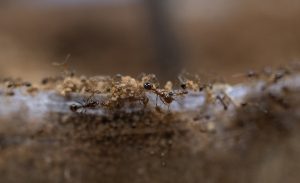
Abbas Ali, principal scientist at the National Center for Natural Products Research, has tested thousands of natural product specimens during his time at Ole Miss. His latest research seeks to find safe and cost-effective natural products that can support fire ant management. Photo by Thomas Graning/Ole Miss Digital Imaging Services
OXFORD, Miss. – New findings from the University of Mississippi School of Pharmacy‘s National Center for Natural Products Research show that two plant oils can effectively repel fire ants.
The papers, recently published in Insects and the Journal of Medical Entomology, investigate compounds found in thyme and turmeric essential oils for their repellency and toxicity against fire ants. The natural compounds were found to be as effective as some synthetic insecticides.
“Imported fire ants are a very dangerous pest, especially for humans because of their bites and the venom that they inject into the body,” said Abbas Ali, NCNPR principal scientist. “Many people are allergic to their bites.

Imported fire ants, listed among the world’s top 100 worst invasive species, are responsible for more than $6 billion annually in damage repair, medical care and control costs. Photo by Thomas Graning/Ole Miss Digital Imaging Services
“It is important for our researchers to find a natural solution to combat them so we can protect human beings and prevent loss to agriculture.”
According to the U.S. Department of Agriculture, fire ants are responsible for more than $6 billion annually in damage repair, medical care and control costs. Besides their impact on humans, fire ants pose a serious threat to crops, agricultural equipment and endangered wildlife.
The USDA’s federal imported ant quarantine aims to manage the spread of the pests by regulating movement of plants, hay and soil-moving equipment.
Listed among the world’s top 100 worst invasive species, fire ants arrived in Mississippi around 1930 and have since spread to every county. Red, black and hybrid imported fire ants are found in the state.
For years, research scientists at the natural products center have studied natural methods to repel mosquitoes in partnership with the USDA. The center’s new focus on fire ants builds upon this work and features some of the same compounds that showed promise against mosquitoes.
The goal is to find effective natural products for the management of fire ants that are safe and cost effective, Ali said.

Farhan Mahmood Shah (left) and Abbas Ali collect sand at the UM Field Station that they will treat with natural compounds to test their repellency and toxicity against fire ants. Photo by Thomas Graning/Ole Miss Digital Imaging Services
“Synthetic insecticides can harm humans in numerous ways – they go through the food chain and damage the environment,” said Farhan Mahmood Shah, NCNPR postdoctoral research associate. “Continuous use of synthetic insecticides pose serious threat to human beings and their use is dangerous particularly in and around homes and public places.”
Fire ants live in mounds, which creates a microenvironment that protects them from the outside environment. The scientists use bioassays, or biological tests, that leverage the digging behavior of the fire ant. They treat sand with natural compounds to test their repellency and toxicity.
Ali said he is excited about the outcome of the initial studies and looks forward to the next step in the research: determining how long the effects of the treatments last.
“Until now, we didn’t have any natural products that were being used to manage fire ants under field situations,” he said. “With the discovery of the repellent activity of these natural compounds, we are hopeful that this is going to make a real difference with the way that fire ants are controlled.”
This research was supported by the U.S. Department of Agriculture, Agricultural Research Service through grants 58-6066-1-25 and 58-6066-6-043.